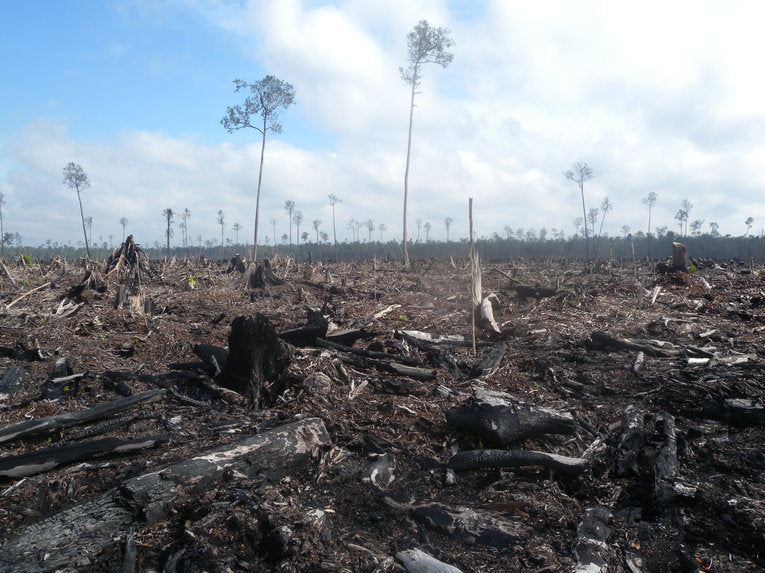Next time you go shopping for paper products, please take a moment - or even an hour - to find out if the items you're about to purchase come from Asia Pulp & Paper(APP), a paper giant that is part of the Indonesian conglomerate Sinar Mas Group.
If they do, please don't buy them. According to Eyes on the Forest and WWF-Indonesia, a Sumatran based coalition of environmental NGOs, APP has been clear-cutting forests in Indonesia for almost three decades, even as it pretends to be a green operation wholeheartedly dedicated to the protection of endangered ecosystems via extensive public relations greenwashing.
For example, here's the story of what APP has been doing at the Senepis Buluhala Tiger Conservation Area. In 2006, after attempting - and failing - to stop the Indonesian government from protecting vital tiger habitat in Riau province, Sumatra, APP decided to jump on the environmental bandwagon and vocally endorsed the creation of the new wildlife sanctuary, which was cobbled together from protected patches of tropical forest and land owned by forestry companies.
Although APP was only a minor contributor, its PR team touted the company's participation in the tiger sanctuary as proof of APP's profound and extensive commitments to environmental protection. They continue to repeat this argument even today.
Even as APP talks about its green conscience, however, at least one of its wood suppliers has been busy clear-cutting the APP-controlled areas of the Senepis peat swamp forest. This is what Eye on the Forest has recently discovered through a combination of field research, satellite image analysis, and the study of government concession data.

Credit: © Eyes of the Forest / WWF-Indonesia
The clear-cutting of the forest is having disastrous consequences for the tigers (whose natural habitat is fast disappearing), the local people (attacks on villagers by starving tigers are on the rise), the peat swamp ecosystem as a whole, and even the planet (since peat draining is a substantial source of greenhouse gas emissions).
The same act of duplicity on the part of APP - i.e., an environmental P.R. campaign combined with conscious reliance on clear-cutting wood suppliers - is occurring in other parts of Indonesia as well, with horrifying consequences for the country's environment, as shown in the Eyes on the Forest's report.
It's also very likely that it will continue unabated, given the company's track record and the fact that it simply does not have an adequate supply of plantation wood for its existing mills - not to mention the ones already on the planning board - nor does it intend to create one.
Unfortunately, it won't be easy to stop APP's predatory behavior. This is, after all, a powerful giant with plenty of weapons in its arsenal. But here's the glimmer of hope: many of APP's important clients around the world have decided to look for another supplier, at least until the company cleans up its act. We little fish should take our cue from them and do our part.
APP has provided a response: Via a news release titled "Asia Pulp & Paper (APP) Calls for Facts Not Fiction about Forest Protection."
In summary, WWF has published and promoted a new report from Sumatran NGO 'Eyes on the Forest' which claims that Asia Pulp & Paper is converting parts of the Senepis Tiger Sanctuary in Sumatra into pulpwood plantation. It published 'satellite maps' of the concession operated by APP's supplier, PT Ruas Utama Jaya (RUJ) which showed the 'clear cutting (of) tropical forest inside the Senepis Tiger Sanctuary.' However, it has been proven - through official government maps - that this allegation is totally false.
Asia Pulp & Paper has today published official maps of the concession, which show that the pictures featured prominently in the EOF report (and in the Green Blogs post) are actually from RUJ's legally-operated pulpwood concession OUTSIDE of the Senepis Tiger Sanctuary. The map and associated images can be found here: http://www.flickr.com/photos/asiapulppaper/sets/72157628403546091/










